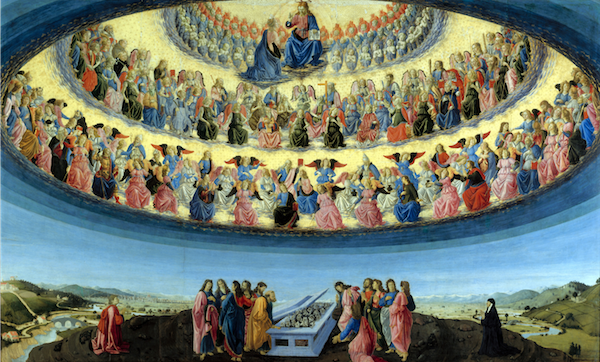The Assumption
Lost in wonder, love and praise
When we say the Litany of Our Lady, she is invoked with all those marvellous titles, mostly biblical, that Christians have given her over the centuries. Among them she is called Queen, Queen of Angels, Queen of Patriarchs, Queen of Prophets and so on. I have always been intrigued by the title Queen of Prophets. What can it mean? In today’s Gospel, which recounts the Visitation, Elizabeth says to Mary, “Blessed is she, indeed, who believed that the promise made her by the Lord would be fulfilled.” That is why she is called the Queen of Prophets. She believed that God would fulfil his promise, “You shall bear a Son,” and because of her faith, she was blessed by God. “Blessed art thou among women.”
Mary is the greatest prophet in the Bible. The prophets of old believed the word of the Lord with such conviction that they preached that word fearlessly to the people of Israel. Think of Isaiah, Jeremiah or Elijah. A prophet hears, listens, believes and proclaims, but Mary went much further than that. Because of her assent to God’s word, she was able to respond, “Behold the handmaid of the Lord. Let it be done unto me according to thy word.” In her womb God’s Word became the Word made flesh, and she proclaimed God’s glory not only in her hymn of praise, “My soul proclaims the glory of the Lord”, but in the Virgin birth itself. “Blessed is the fruit of thy womb, Jesus.”
Mary’s participation in the Incarnation goes beyond the conception and birth of her Son. She took part in his ministry on earth and is now Mediatrix of all graces in heaven. At the marriage feast of Cana, she asks her Son to perform a miracle and instructs the steward, “Do whatever he tells you.” On Calvary, at the foot of the cross, a sword pierces her heart as she suffers in her own flesh the Passion of her Son. The Church, the community of disciples, is entrusted to her care in the person of the Beloved Disciple. As they await the coming of the Holy Spirit, she is there at the heart of the Church praying with the disciples. We believe, for it is the ancient belief of an undivided Church, that she was the first to share fully in the Resurrection and Ascension of Jesus Christ. That is why the Assumption is known as Little Easter and in some countries Catholics make their Easter duty today.
The Assumption was a prophetic act, for on the Last Day we too will go where she has gone before us. Mary is a prophetic icon of what the whole Church will be, when the New Heaven and New Earth are revealed. On the Last Day the dead will rise from their graves and our bodies, long returned to the dust from which they came, transfigured and glorified, will be assumed into heaven and reunited with our souls. We will take our place with Mary at the Father’s right hand in the Kingdom of Heaven. Like her, we too will receive a crown of glory.
I wonder if Charles Wesley had Our Lady in mind when he wrote:
Finish then thy new creation,
Pure and spotless let us be;
Let us see thy great salvation,
Perfectly restored in thee,
Changed from glory into glory,
Till in heaven we take our place,
Till we cast our crowns before thee,
Lost in wonder, love, and praise.
Before 1854 the words “pure and spotless” always referred to the Immaculate Conception. Think of all those churches in Spain and Latin America dedicated to the “Virgen pura y limpia” and in Italy to “la Purissima”. Of course, the Assumption is the logical conclusion to the Immaculate Conception, the ultimate tying up of loose ends, as St Anselm wrote. The Preface of the Mass puts it this way: “Today the Virgin Mother of God was assumed into heaven as the beginning and image of your Church’s coming to perfection and a sign of sure hope and comfort to your people.”
Getting to heaven, though, is not an easy matter. There is the question of our obedience and submission to God’s will. How often have we said “Fiat” and then turned our backs on God? In Mary there is consistency and integrity, no breach between word and action. Then there is the problem of sin and evil, which has to be sorted out and put right in each one of us. We need to die each day to sin in order to live for God. We have to take up our cross and follow Christ through thick and thin. In this daily struggle may Our Lady, Queen of Prophets, pray for us and encourage us to walk, “from glory to glory”, until with her “we cast our crowns before thee, lost in wonder, love, and praise.” Amen.










